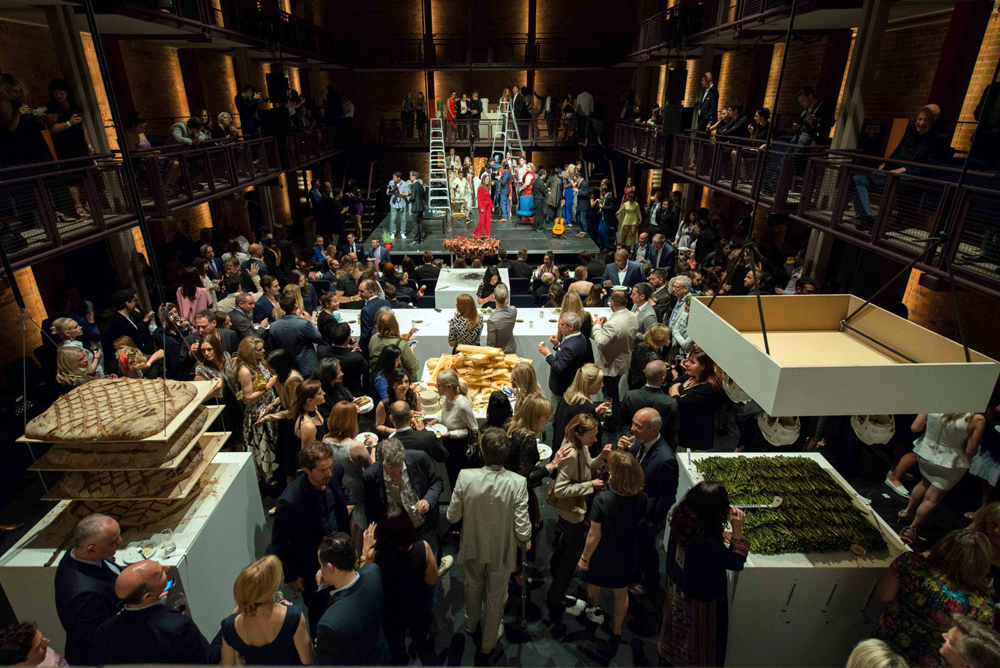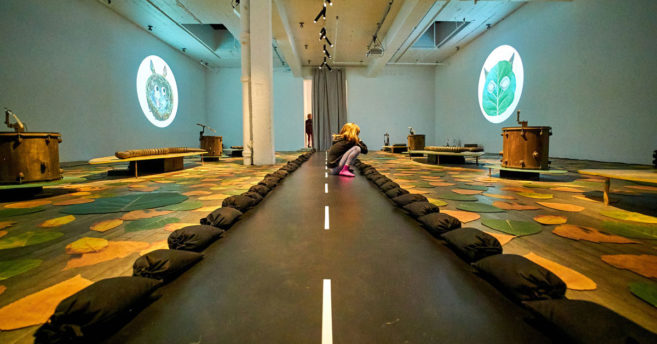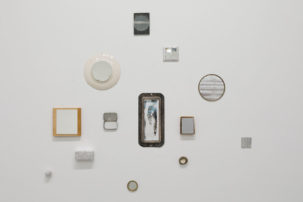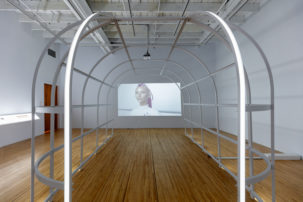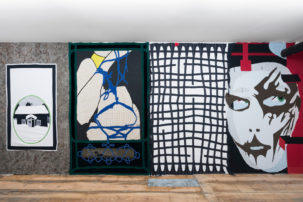In the opening scene of Ben Lerner’s 2014 novel 10:04, the main character celebrates the signing of a lucrative book deal by dining on bluefin and baby octopus that have been “massaged gently but relentlessly with unrefined salt until their biological functions cease.” Stunned as to why he’s been given such a generous sum, and empathically disturbed by the absurd decadence of gorging on creatures so intelligent that they decorate their own dwellings, he mentally calculates that the six figures he’s been given amount to “about twenty-five years of a Mexican migrant’s labor, seven of Alex’s in her current job. Or my rent, if I had rent control, for eleven years. Or thirty-six hundred flights of bluefin, assuming the species held.”
I entered the performance space of Jennifer Rubell’s So Sorry, the main event at this year’s Power Ball—the Power Plant’s annual gala fundraiser and hot-ticket art-society event—wearing the sample-sale designer dress I’ve worn to the last four upscale events I’ve gone to. I thought of Lerner’s protagonist, not least because of the resplendent cephalopod chandelier hanging in the centre of the room. This year’s theme was “Appetite for Excess,” and a Bacchanalian feast was underway at various food stations. Everything was literally stacked: enormous loaves of rustic sourdough, an oozing pile of golden honeycomb next to wheels of sharp cheese, an altar of roasted asparagus spears, a sticky choux-pastry Tower of Babel construction, hip-height drawers of herbed new potatoes and spits of caramelized ham hock installed into alcoves in the wall.
Near the centre of the room, a crowd gathered around a long white table with fist-size holes cut into it. A peek through the holes revealed a busy kitchen assembly line set up with prep stations and an expediter directing the show. I was eerily reminded of Santiago Sierra’s Workers Paid to Remain Inside Cardboard Boxes (1996–98), but saw faces smiling as workers interacted with guests. A never-ending procession of protruding hands offered delicious morsels of finger food: cured meats, fried chicken, sausage rolls, leafy radishes and bocconcini balls draped with slivers of oily fish and a smattering of allium blossoms. I helped myself to at least three of the latter. It was a luxuriant display of overindulgence, reminiscent of Marina Abramović’s controversial art direction at the Los Angeles Museum of Contemporary Art’s 2011 gala, and party guests blissfully lapped it up.
Onstage, Winsome Brown performed her one-woman play This Is Mary Brown to a distracted audience, her voice and ukulele muffled by the clinking, chewing, chattering and camera flashing of VIP partygoers. Satiated, I wandered away from the banquet to see what was going on in the main gallery space. Karen Kraven’s larger-than-life figure-skating leotards and nylon pantyhose were suspended from the ceiling in one room, accompanied by mounted screens playing looped recordings of professional ice-skating events. Orest Tataryn’s plastic, neon and fabric sculpture yellow waterfall adorned a wall in another room. To my surprise, a jumbo split-screen projection of William Wegman’s Weimaraners flickered in the DJ area.
The Wegman work had been brought in by the Power Plant’s presenting sponsor, luxury retailer Max Mara. Apparently, the brand also offered Power Plant members a shopping discount—a promotional scheme that irked artist A.A. Bronson, who tweeted on May 19, “Power Plant Toronto invited me to an evening of shopping with 10% discount at Max Mara to ‘celebrate’ a partnership. Is this real?” He followed up on May 27: “I cancel my Lifetime Membership @ThePowerPlantTO to express my lack of faith.”
Also critical of the institution’s plutocratic approach was a contingent of local emerging artists invited to volunteer at a portion of Rubell’s performance called the Peanut Gallery. Artists were offered free tickets to the $500-a-pop gala under the condition that they perform, unpaid, for six hours (with two 15-minute breaks). When Abramović and Jeffrey Deitch hired performers for $150 each to act as human-head centrepieces at the 2011 MOCA gala, modern-dance doyenne Yvonne Rainer cried exploitation. Rubell seemed to be offering even less. “You and the Peanut Gallery members are too cool for school,” the invitation instructed, “so you’ve formed your own party on the Harbourfront Theatre’s Mezzanine, where you’ll be throwing back brewskies, snacking on chips and listening to your own music, all while the VIPs grace the floors below.” As it happened, the third floor seemed largely unoccupied during the performance, but the first-floor VIP level thronged with young artists. The plain Old Dutch chips provided for the Peanut Gallery did enjoy a moment of performance glory, however—some rambunctious revellers on the second-floor balcony tried to start a food fight (which Rubell didn’t plan for, but apparently consented to letting continue), shaking out a bag and sending chips floating down like a breeze of cherry-blossom petals.
Local artist-run centre 8-eleven’s site-specific commissioned project was a tricked-out white stretch limousine with a red police-car strobe light affixed to its roof, parked in a room engulfed in a projection of flames furiously licking the walls. To enter the limo, guests travelled through an infinity-mirrored tunnel that reflected a multiplied number of faces looking back at them. The set-up reminded me of another recent tweet, this time by Helen Rosner, features editor at food-news website Eater, written in response to the Baltimore riots: “Better when burned: hot dogs; marshmallows; sugar; cheese; our entire goddamn racist sexist society all the way to the motherfucking ground.”
Power Ball’s press release promised to “expose a multitude of thought-provoking excesses” and investigate “the fine line between decadence and debauchery through visual art, music, fashion and food.” Certainly, we live in a culture of excess. A new law in France decrees that food retailers donate unsold food to charity. In a 2004 Statistics Canada report, it was revealed that Canadians waste approximately 2.3 million tonnes of food each year, which is enough to transform the Rogers Centre into an overflowing cornucopia many times over. At Power Ball, as with any well-planned major event, there were leftovers, but little went to waste: for one group of frugal artists, the night ended with a giddy feast of duck and honeycomb, eaten directly out of an industrial black-plastic garbage bag in the Power Plant parking lot.

